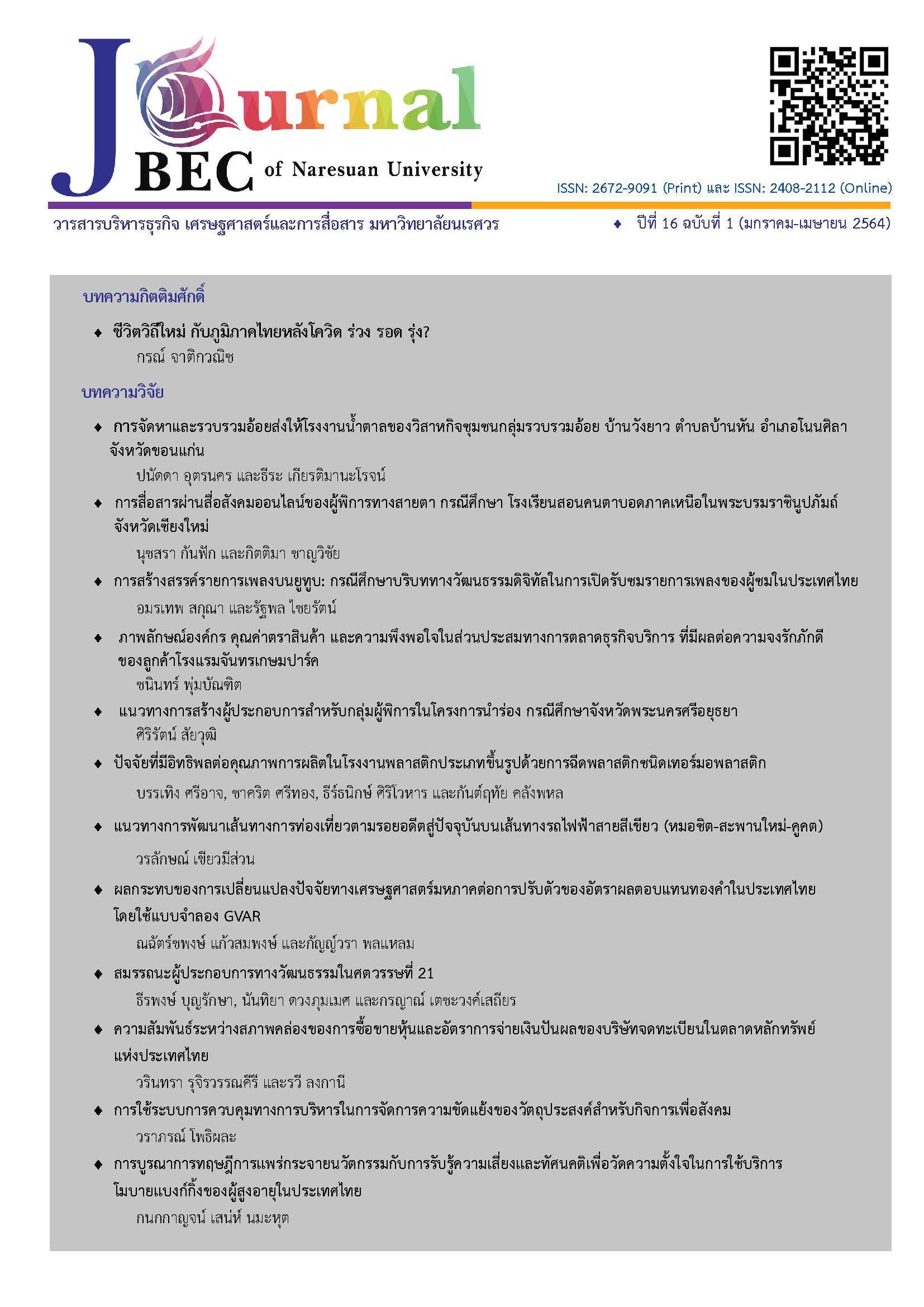แนวทางการพัฒนาเส้นทางการท่องเที่ยวตามรอยอดีตสู่ปัจจุบัน บนเส้นทางรถไฟฟ้าสายสีเขียว (หมอชิต-สะพานใหม่-คูคต)
Main Article Content
บทคัดย่อ
การศึกษาครั้งนี้ มีวัตถุประสงค์เพื่อค้นหาแหล่งท่องเที่ยวที่เชื่อมโยงประวัติศาสตร์และศึกษาถึงเรื่องราวประวัติศาสตร์วัฒนธรรมของแหล่งท่องเที่ยวตามเส้นทางรถไฟฟ้าสายสีเขียว (หมอชิต-สะพานใหม่-คูคต) เพื่อศึกษาความคาดหวังของนักท่องเที่ยวตามเส้นทางรถไฟฟ้าสายสีเขียว (หมอชิต-สะพานใหม่-คูคต) และเพื่อหาแนวทางการพัฒนาเส้นทางการท่องเที่ยวตามรอยอดีตสู่ปัจจุบันบนเส้นทางรถไฟฟ้าสายสีเขียว (หมอชิต-สะพานใหม่-คูคต) การวิจัยครั้งนี้เป็นการวิจัยแบบผสมผสาน ซึ่งประกอบด้วยการวิจัยเชิงคุณภาพ และการวิจัยเชิงปริมาณ ผลการศึกษาพบว่า การศึกษาด้านความคาดหวังของนักท่องเที่ยวต่อแหล่งท่องเที่ยวบนเส้นทางรถไฟฟ้าสายสีเขียว (หมอชิต-สะพานใหม่-คูคต) นักท่องเที่ยวมีความคาดหวังต่อการท่องเที่ยวในด้านการเดินทางที่สะดวกสบาย การมีสิ่งอำนวยความสะดวกต่าง ๆ ครบครัน และมีความคาดหวังในระดับมากต่อแหล่งท่องเที่ยวบนเส้นทางรถไฟฟ้าสายสีเขียว (หมอชิต-สะพานใหม่-คูคต) โดยมีความค่าเฉลี่ยของความคาดหวังด้านความปลอดภัยในการเดินทางมากที่สุด สำหรับแนวทางในการพัฒนาเส้นทางการท่องเที่ยวตามรอยอดีตสู่ปัจจุบันบนเส้นทางรถไฟฟ้าสายสีเขียว (หมอชิต-สะพานใหม่-คูคต) พบว่า สมควรได้รับการพัฒนาให้เป็นแหล่งท่องเที่ยวที่มีชื่อเสียง โดยเฉพาะอย่างยิ่งการประชาสัมพันธ์ให้บุคคลทั่วไปได้รู้จักแหล่งท่องเที่ยวในเขตพื้นที่นี้เพิ่มมากขึ้น ควรมีรูปแบบที่มีคุณค่าทางวัฒนธรรม เป็นแหล่งท่องเที่ยวที่มีกิจกรรมหลากหลายน่าสนใจ สะท้อนเรื่องราวต่าง ๆ ในอดีตได้ดี ซึ่งจะต้องทำให้ผู้ที่เดินทางมาท่องเที่ยวได้รับรู้ถึงประวัติ เรื่องราว วิถีชีวิตต่าง ๆ ในอดีต สามารถมองเห็นภาพของเรื่องราววิถีชีวิตในอดีตได้ชัดเจนยิ่งขึ้น มีมุมของการนำเสนอสิ่งของหรือรูปภาพในอดีตเพื่อการถ่ายภาพเป็นที่ระลึก การเขียนเรื่องราวต่าง ๆ บนฝาผนังเพื่อให้ผู้ที่เดินทางมาท่องเที่ยวได้มีความรู้เพิ่มขึ้นจากการได้มาท่องเที่ยว และมีความคิดเห็นในระดับมากต่อการพัฒนาและส่งเสริมด้านการท่องเที่ยวของนักท่องเที่ยวต่อแหล่งท่องเที่ยวบนเส้นทางรถไฟฟ้าสายสีเขียว (หมอชิต-สะพานใหม่-คูคต) โดยมีค่าเฉลี่ยของการดำเนินการโดยคำนึงถึงศักยภาพในการรองรับนักท่องเที่ยวมากที่สุด
Article Details
เอกสารอ้างอิง
Buntong, P. 2007. Expectation of perception of service quality And trends in behavior of using the MRT service of users in Bangkok. Independent Study of Master Degree Srinakharinwirot University.
Chaiworaporn, A. 2002. Movies in Thai life: perspectives of educational films. Bangkok: Dokyai group.
Chatchaiyarunk, B. 2008. Tour repackaging of Northern Thailand for Thai Tourists. Independent Study of Master Degree Chiang Mai University.
Jittangwattana, B. 2005. Sustainable Tourism Development. Bangkok: Press and Design.
Kitiasa, P. 2003. Anthropology and the study of past year phenomena in contemporary Thai society. Bangkok: Princess Maha Chakri Sirindhorn Anthropology Centre (Public Organisation).
Kumuthadevi. (2013). ServiceQuality of South Indian Railway -Determinants of Passenger Satisfactionin Trains.Sheeba. Karpagam University,Coimbat International. Journal of Business and Management Invention. 2, 49-54.
Lai, Wen-Tal. & Chen, C. F. (2011). Behavioral intentions of public transit passengers--The roles of service quality, perceived value, satisfaction and involvement. Transport Policy. 18, 318-325.
Pumma, N. 2011. Yearning for the past and the trend of Thai tourism industry. Retrieved 22 March 2019 from https://www.academia.edu/27979673/ Yearning for the past and the trend of Thai tourism industry_Nostalgia_in_Thai_Tourism_Industry.
Srijitpong, N. 2007. Factors influencing the decision to use the MRT ticket. Bangkok: Ramkhamhaeng University Library.
Srisombat, P & Vengampon, N. 2013. The research report on basic infrastructure network analysis: a case study of the connection of the main road network, secondary road and rail mass transportation system in Bangkok. Bangkok: Infrastructure Strategy Division.
Suwan, M., et.,al. 1998. Project to study guidelines and tourism management in the responsibility areas of the Subdistrict Administration Organization and the Tambon Council. Bangkok: Tourism Authority of Thailand.
Syed. M. I., Daisy, M., Hung, K. & Saman, S. (2012). Service Quality and Rail Transport inPakistan : A Passenger Perspective. Pakistan University Sains Malaysia., World Applied Sciences Journal. 18(3), 361.
UNWTO. (1997). Tourism 2020 Vision. Madrid: UNWTO.
Vroom, V. H. (1964). Work and motivation. New York: John Wiley & Sons.
Wongwipak, C. 2009. Cultural Tourism. Bangkok: Silpakorn University.
Wu, P., Huang, C., & Chou C. (2014). Service expectation, Perceived service quality, And Customer Satisfaction in food and beverage Industry. International Journal of Organizational Innovation. 7(1), 171-180.


